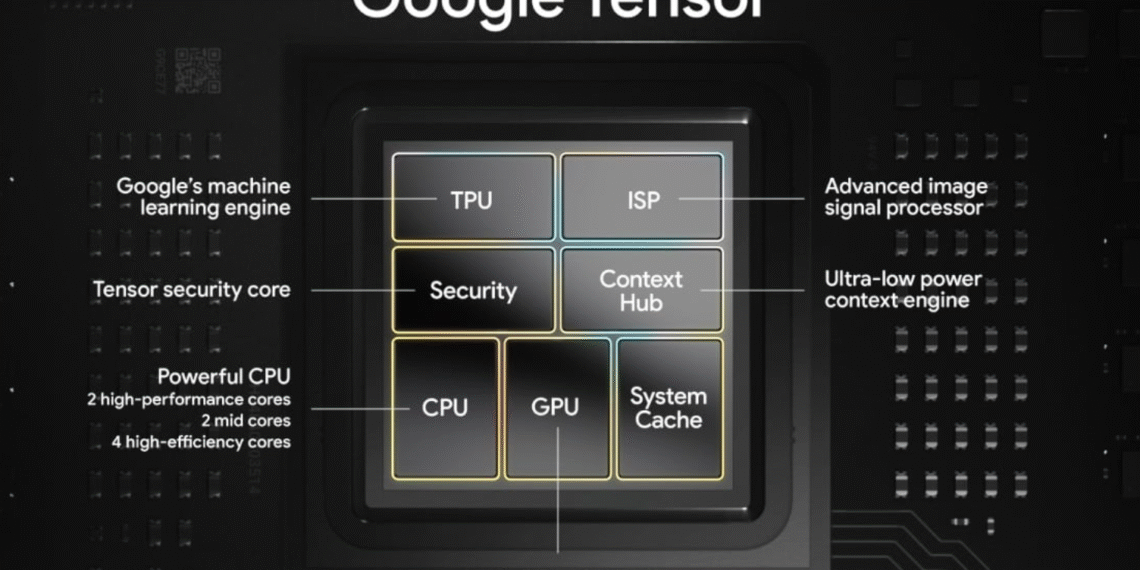Google has recently announced a partnership with Taiwanese semiconductor company TSMC to secure a steady supply of their custom made Tensor chips for their upcoming Pixel phones until at least 2024. The move comes as Google looks to reduce reliance on other chip manufacturers and take control of their own hardware components.
![]()
The Tensor chip, which is specifically designed for Google’s artificial intelligence (AI) and machine learning (ML) needs, made its debut in the Pixel 6 and Pixel 6 Pro. Its powerful performance and use of cutting-edge technology have made it a key component for Google’s vision of a more personalized, efficient, and user-friendly smartphone experience.
Google is preparing a significant shift in its approach to semiconductor production for its Pixel devices. The Tensor G4 chipset is expected to be the last one manufactured by Samsung, as Google pivots to building a stronger relationship with TSMC. This partnership aims to utilize TSMC’s advanced technology to enhance the competitiveness of Google’s smartphones and tablets in the market.
Reports indicate that Google’s executives have recently engaged with TSMC in Taiwan to finalize a collaboration anticipated to last up to five years. The transition will begin later this year with the introduction of the Tensor G5 chipset, which is poised to feature TSMC’s cutting-edge 3nm manufacturing technology.
Key Takeaways
- Google plans to shift Tensor chip production from Samsung to TSMC.
- The Tensor G5 will debut as the first chip built on TSMC’s advanced 3nm process.
- The Google-TSMC collaboration may extend for up to five years.

With Google’s New Agreement, Tensor Chips Could Power Pixel Phones Through the 14 Series
Google is taking steps to enhance its smartphone lineup by shifting the production of its Tensor System-on-Chip (SoC) to TSMC. This decision comes as Samsung struggles with manufacturing challenges, particularly with its 3nm GAA process. Instead, Google aims to leverage TSMC’s second-generation 3nm technology known as N3E, which is expected to bring improved efficiency and performance to the Tensor G5 chips.
The upcoming Pixel 10 series, anticipated to debut in late 2025, could be among the first to benefit from this partnership. By collaborating with TSMC, Google aims to ensure a steady supply of advanced chips for future devices, including potential flagship models like the Pixel 9 Pro and Pixel 10. The multi-year deal reportedly positions Google to rely on TSMC’s cutting-edge processes for five years, possibly extending production through the Pixel 14 lineup.
Key Design Enhancements of the Tensor G5 Chips
- Core Architecture: The Tensor G5 is expected to feature Cortex-X4, Cortex-A725, and Cortex-A520 cores.
- Memory Efficiency: Enhanced memory bandwidth to support demanding applications.
- Performance Boost: While based on N3E, which is behind competitors’ N3P chips, optimizations could maintain competitiveness.
Google’s decision to partner with TSMC aligns with the foundry’s technological leadership. Although TSMC is preparing for its next-generation 2nm process for 2026, Google’s Tensor chips will continue utilizing refined 3nm nodes for now. This approach balances performance and efficiency while staying cost-effective.
By distancing itself from Samsung’s manufacturing hurdles, Google is positioning its Pixel phones to compete strongly in the premium smartphone market. TSMC’s reliability and advancements will help the company deliver better performance across its devices.
Frequently Asked Questions
Why is Google partnering with TSMC to manufacture Pixel smartphone chips?
Google is working with Taiwan Semiconductor Manufacturing Company (TSMC) to produce custom chips for its Pixel smartphones. This partnership aims to enhance the efficiency, performance, and lifespan of Pixel devices while allowing Google to better control chip design and production processes.
How does the collaboration between Google and TSMC improve chip durability and performance?
This partnership focuses on creating advanced chipsets designed to deliver consistent performance over a longer period. By leveraging TSMC’s cutting-edge manufacturing technology, Google can ensure its chips maintain strong functionality and reliability for up to five years.
What innovations are Google and TSMC using to support extended chip lifecycles?
Google and TSMC are integrating pioneering advancements, such as smaller transistor nodes, like 2nm technology. These innovations help improve energy efficiency, heat management, and overall sustainability, contributing to an extended lifecycle for Pixel smartphone chips.

How does Google’s partnership with TSMC reflect its sustainability initiatives for devices?
Google’s collaboration with TSMC aligns with its commitment to sustainability by reducing electronic waste. Building durable chips that last five years minimizes users’ need to upgrade frequently, supporting eco-friendly practices for both the company and consumers.
What advantages will consumers gain from Google’s partnership with TSMC?
Users can expect better device longevity, consistent performance, and energy-saving technology in future Pixel smartphones. These enhancements may also lower long-term ownership costs, as devices require fewer repairs or replacements over their extended lifespan.
How could the Google-TSMC partnership affect competition in the smartphone chip market?
![]()
Google’s strategy to design and produce chips in collaboration with TSMC could challenge rivals that rely on third-party designs. By pushing innovation in custom silicon development, Google and TSMC may influence industry trends and increase competition among other manufacturers.
In the highly competitive smartphone market, having control over the key components of a device can be a game-changer. This partnership between Google and TSMC is a sign of a shifting landscape where companies are looking to have more control over their hardware and software integration.
With the agreement in place, Google can now focus on their upcoming Pixel devices, while strengthening their position in the AI and ML space. This partnership also gives them the room to explore new ideas and capabilities for future devices, bringing them one step closer to their goal of creating the ultimate personalized smartphone experience.
In conclusion, the collaboration between Google and TSMC marks a significant milestone for both companies and the smartphone industry as a whole. By securing a steady supply of their own custom chips, Google is taking big strides towards their vision for the future of smartphone technology.





































